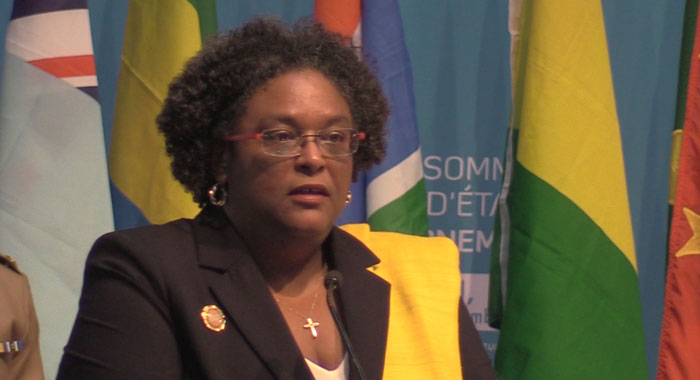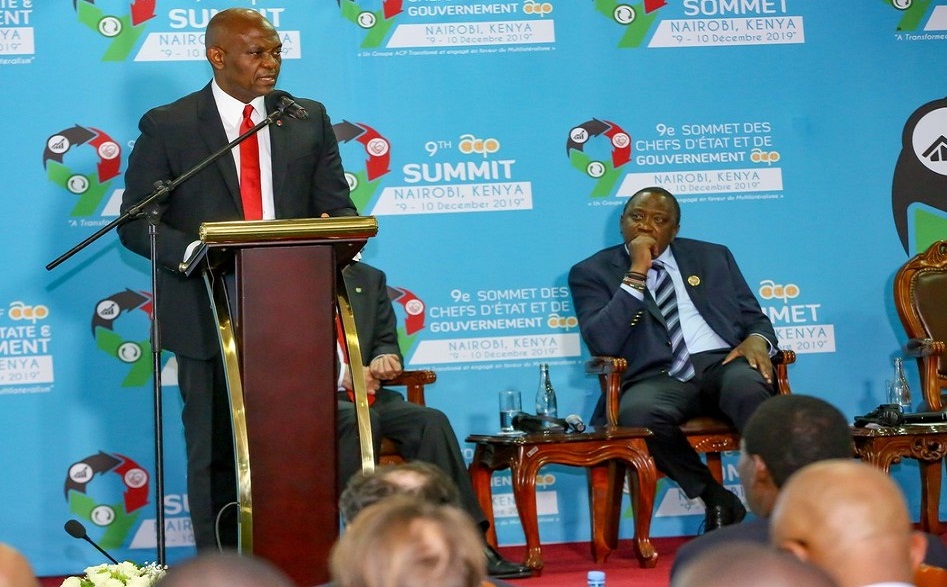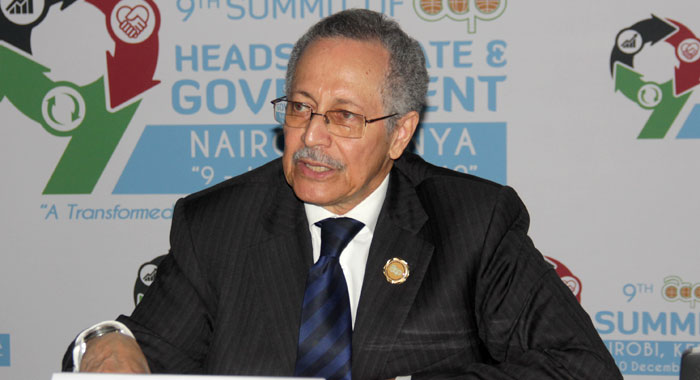By Kenton X. Chance
NAIROBI, Kenya (CMC) — As the Caribbean struggles to respond to de-risking and other challenges in its financial sector, at least one Caribbean prime minister believes that the solutions can be found through closer economic ties with Africa.
Caribbean countries have been arguing that de-risking — the threat by banks in developed countries to withdraw correspondent banking services — would exclude the region from the global finance and trading systems with severe consequences for financial stability, economic growth, remittance flows and poverty alleviation.
At the same time, the region is trying to cope with excess liquidity, and in some countries, such as Barbados, commercial banks are paying as little as 0.01% interest per annum on deposits.
Canadian banks are selling most of their assets in the Caribbean. On Thursday, Royal Bank of Canada (RBC) announced it had entered into definitive agreements to sell all banking operations in the Eastern Caribbean to a consortium of indigenous banks within the region.
The move by RBC follows a similar action by another Canadian-based bank, Scotiabank to sell off its operations in at least eight Caribbean jurisdictions.
Barbados Prime Minister, Mia Mottley, addressing the inaugural business summit of the 79-member African, Caribbean and Pacific Group of States (ACP), last Sunday, said that the concept of de-risking has come about “because the Canadian banks don’t believe that they are large enough to matter for them to take the time to put systems in place.
“It is a notion that is incomprehensible because it is telling you, as we have said, continuously, that we are invisible and indispensable, not just in terms of climate change but also in terms of day-to-day functioning of access to finance,” she told the high-level dialogue between ACP head of states and captains of industries.
Mottley said she does not believe that the Caribbean is invisible or dispensable for Africa or the Pacific “and therefore, we will work, cooperatively, because equally, pound for pound, the Caribbean has produced more Nobel laureates, more genius, more sporting athletes, more people with capacity.
“And the bottom line is that we have, therefore, lessons we can share, if given the opportunity so to do,” she said, noting, however, that the ACP exists in a world that, “regrettably, is north-driven, as is also the case with the instability now taking palace globally.
“And we have to, at some point, determine
where we are prepared to reclaim our destiny or not,” Mottley said, adding that
leaders must lead “and I hope that is what we doing now to create the
opportunities for you in the business community”.

Mottley told the panel, whose members included President of Seychelles, Danny Faure, Nicolas Nesbitt, chair of Kenya Private Sector Alliance chair of the East African Business Council, and Ambroise Fayolle, vice-president of the European Investment Bank that ‘for us this is a unique moment because it signals our intention to really try to claim our destiny.
“We have an opportunity that, however, must be premised on getting not to know about each other but to know each other,” she said, adding there is a big difference between the two.
“Knowing about each other means that we are likely to continue our habits to trade North. Knowing each other means that we are likely to take down the walls and to begin to understand the values and the challenges that confront each of us and by extension, to see the entrepreneurial opportunities that may be available to build prosperity among our people.”
During the panel discussion, a member of the audience noted that trade flows are limited within the ACP and wanted Prime Minister Mottley’s views on how trade can increase within the bloc and how can ACP members begin to think of themselves as one bloc and its people as one people.
Mottley said this is going to be difficult “in the absence of dealing with the elephant in the room: travel and the movement of goods”.
She said her government has signed a cooperation agreement with Ghana’s port at Tema and she believed whether it is Barbados-Jamaica-Bahamas, that there are opportunities for hub arrangement to be able to access North, Central and South America from the Far East and Middle East, coming through Africa.
Mottley said that this has to be realised by working with private sector companies, even as she acknowledged that the Caribbean and Africa need to address air travel
“That there is only direct travel as evidence in the Middle Passage is the greatest scar in the 20th Century in the post-Independent movement of African and Caribbean Leader and I hope we can remove than blemish from our record. Because we are the ones now who have it within our grasp to make that travel direct rather than to be pawns of history or victims of history.”
Mottley said that Africa-Caribbean trade links cannot simply be about providing jobs. It has to be also about economic enfranchisement, creating a basis for ownership among our people because that is the only way to is going one sustainable.”
She said African and Caribbean nationals general migrate North, rather than East or West to each other’s region “and it is a nonsense because if I told those of you who were interested in banking and finance that we have a serious problem in the region with correspondent banking and de-risking and the fact that ordinary members of our society are finding it difficult to even open a bank account, then what has happened here in Kenya with the Equity Bank may well now be a model to happen in CARICOM”.
Equity Bank, a Kenyan financial institution, also has branches in Rwanda, South Sudan, Tanzania, and the Democratic Republic of the Congo.
Mottley said Equity Bank has been able “to use the virtue of trust to broaden the base of participation and finance in this country in a way that we the Caribbean Community is crying out for, rather than being hostage in a few international bank that are not responding to our domestic needs and challenges are but are responding to one-size-fits-all prescriptive that are being imposed upon it from the North Atlantic countries.
Mottley is not the first Caribbean Community (CARICOM) leader to suggest a similar response to de-risking.
In July, Antigua and Barbuda Prime Minister, Gaston Browne, who is leading the region’s response to the corresponding banking relationship (CBR) matters, told the Caribbean Media Corporation (CMC) at the annual summit of CARICOM leaders that the Caribbean should establish a bank that would allow the region to counteract the position of international banks regarding corresponding banking.
Another African financial (UBA) institution that might provide useful lessons for the Caribbean as it confronts de-risking is the United Bank for Africa, which has 70 years of uninterrupted banking operations, and has as 20 African subsidiaries.

The featured speaker at the ACP Business Summit was Tony O. Elumelu — a Nigerian economist, investor, and philanthropist – who is also chair of UBA. Elumelu said that the ACP regions share common concerns, but also common opportunities.
“In our world of sometimes brutal geopolitics, we need to have our voices heard — our issues on the table and our agenda addressed,” he said, adding that ACP countries face the greatest challenges from climate change, unfair trade practices and “the tragedies of emigration”.
He noted that he was speaking as chairman of UBA, which he described as “Africa’s global bank”, pointing to its presence in 20 African countries as well as operations in three major financial centres of the world: Paris, London and New York.
“UBA is a force for development in Africa, through infrastructure investment and leading the way in cross border payments and services, with the objective of encouraging trade across the continent,” Elumelu said.
“Through our offices in New York, London and Paris, we work with large development finance institutions, multilateral organisations and corporates by facilitating capital flows into Africa and providing international trade services.”
The objective of the business summit was to offer a framework of a high-level dialogue between ACP heads of states and ACP captains of industry to share information and practice on implementable decisions and investment plans and concrete projects.
It was also a forum for the exchange of idea on policy, legislative, institutional and capacity building measures in the area of Industrial, transformation, of/for ACP countries — including blue and green economies – and entrepreneurship acceleration strategies and processes for ACP countries and intra-ACP investment, trade and development for ACP countries.
The business summit also provided an opportunity for discussions on the impact of climate change and Mottley said that some challenges confronting the ACP, including the impact of climate change, also provide opportunities.
She said there are also opportunities in the blue and green economy, changing how ACP countries respond to restructuring their economy to be renewable-energy driven. Rather than looking north, Africa and the Caribbean ought to be looking at each other to mobilise liquidity.
Mottley said the ACP bloc is being told that if they want to move to electric cars they have to wait because manufacturers will first satisfy Europe and North America.
“So where are the opportunities within Africa for the establishment of manufacturing plants that are looking to create and build the electric or hybrid cars that are needed to power the south.
“And why are we not working in a cooperative manner leveraging both capital — human and financial – form all three regions in order to build out whatever industries we are building, whether here there or in the Pacific,” she said, adding that the Caribbean has a mature relationship in managing tourism products.
“Why aren’t Jamaica and Barbadian chains establishing in Africa in tourism” she said, and equally question the non-expansion of Kenyan agricultural diversification to the Caribbean, particularly to countries like Suriname, Guyana and Belize.
“So, my friends, the opportunities are great but we don’t know each other. We know about each other. And the only people who can change that is ourselves,” Mottley said, but noted that change is not easy.
“But we need to step outside of the comfort of the familiar and recognise that we are, actually, more alike than we think because we come from the same values, the same people the same everything. It is just that we have allowed the sea and others to separate us. I believe that a few people must lead the way, because success if a habit,” Mottley said.

Meanwhile, the outgoing ACP Secretariat General Patrick I. Gomes, told CMC that ACP trade links should be developed.
The Guyana born diplomat, noted however that there is a major problem both in terms of the supply side and the connectivity.
He said, however, said that molasses from Fiji has been servicing a lot of the rum industries in the Caribbean for years and that the ACP has also had a very successful public-private partnership on rums and spirits.
“We spoke about it as [early as] 2005-6, a partial scope agreement, a study was done — an intra-ACP free trade agreement. We have to look at where we can have a partial scope in certain things,” he said, adding that fisheries is making great strides in what sugar used to do and can do.
“We have also had the possibilities in the beef in those who are exporting, depending on the market. So, I think it will be partial scope relating to how you move up the value chain and this concept now, the value chain will not be restricted to products that come out of the Caribbean,” Gomes said.







This is a long article and I only read part of it; that which expresses the view of PM Mottley She says some useful things and on some of it she does not seem to understand how things work. The Global Finance is totally messed-up. It has been irresponsibly controlled by greedy bankers and politicians. The USA, by having the World Reserve currency, based on thin-air, has been so addicted to global financial exploitation for so long that they cannot get enough to appease thier addiction and things will soon end, and end very badly. How can we prepare ourselves? She seems to think it is stupid to “trade North” but instead trade with Africa. The truth is we should trade where ever possible. To trade mangos to someone that already has mangos will not work out too well. The major problem in the Caribbean is that we do not produce much of anything. That is because the politicians are too stupid to create an environment where production is profitable to allow us to export. The first law of prosperity is to produce more than you consume so that you can export. This does not work when the excess is far too expensive that no one wants to pay more for something that they can get for less. This seems to have been logic that these leaders in the Caribbean have failed to notice. The politicians seem to be too anxious to tax the living daylights out of thier populations making it too expensive to produce anything to export. Mottley and most of the others do not seem to have the ability to use thier brains to suppress thier greed for revenue and instead create an environment for the people-prosperity instead of prosperity for government alone. These governments, by sucking all the opportunity from thier countries will result in making the governments poorer as is the case with Barbados and most all the others. Liat is a great example. She wants the most expensive flights in the world to be even more expensive for the people. Because Africa can produce the same products that we do but at a far lower cost, how will this benefit us? These Caribbean leaders all concentrate on tourism because they want to “fit to the Caribbean”. Did they ever notice that a hand fits a glove because it is the inverse (opposite shape) of the glove, not identical to it?
If I were a leader in this region and I noticed that the other countries were “zigging” I would immediately know that I should be “zagging”. When they “zig” I would “zag”when possible. That is how you “fit” but not by copying them. Look at the vendors in Kingstown. They all make barely enough because they all sell the same thing. They copy eachother. They do not spread wealth that way, They promote poverty. Why does SVG put so much into tourism but do little for agriculture? Don’t all these tourists eat? I know they drink coffee.
Are Saboto Caesar and Ivan O’Neal the only political people in SVG capable of creative-thinking but yet not in authority positions to discuss/negotiate how to apply those ideas which have merit? I have heard great ideas from other political people but all the best ideas are exactly the ones that are most strongly rejected.
This article makes a lot of sense kenton. ‘Developed countries’ care mostly about their own interest. Caribbean leaders mostly only care about looting the treasury and enriching themselves.
There is little or nothing that Africa produces that the Caribbean wants to buy. There is little or nothing that the Caribbean produces that Africa wants to buy. Shipping from Africa to the Caribbean is expensive due to low traffic, and vice versa in reverse. Buying anything from Africa, in particular, Nigeria is fraught with dangers of fraud, there are more crooks per square mile in some African countries than rubber and cacao trees.
Diverse natural resources dominate the Africa trade that the continent enjoys in abundance. If we want to buy gold and diamonds, they are there in abundance, even copper and cobalt.
Oil export has been the mainstay for many economies. Nigeria is one of the world’s largest oil reserves and Africa’s largest oil producer.
However, trade varies from one country to another. Countries such as South Africa represent the higher side of the spectrum, whereas regions such as Burundi have the least trade volumes. A majority of African countries are underdeveloped and, therefore, rely heavily on foreign aids to survive. Africa trade is, therefore, a representation of extremes.
Africa buys from China, France, EU&UK, and the US, what on earth do we have in the Caribbean for them? The answer is nothing.
The Caribbean buys from China, France, EU&UK and US, what on earth do they have in Africa for us? The answer is nothing.
Africa, like the Caribbean, Africa is having more than its fair share of correspondent banking problems. In Africa, 51% of banks reported a decline. There’s a domino effect with correspondent banks following suit in exiting a market. The slump in foreign CBRs affected check clearing, clearing and settlement services, and trade finance (mainly letters of credit) most.
Africa’s banking environment is relatively shallow and less penetrated than most; it is as competitive as those in other developing and high-income regions. The region has made improvements in banking technology and innovation, and in some cases, has leap-frogged ahead of different areas, particularly in mobile banking. But it’s still backward; the Caribbean has little to learn from them.
Over the last decade, global banks have been tightening operations to comply with regulations designed to curtail money-laundering and terrorism-financing. As a consequence, global banks have been limiting correspondent banking relationships (CBRs) with local banks in emerging and developing economies – a practice referred to as “de-risking.” Africa, like the Caribbean, has enormous problems with theft and fraud by its leadership, leading to money laundering becoming an art. It’s worse in Africa because the numbers are higher, there is quite simply much more to steal.
I just cannot understand what Caribbean leaders are doing wasting their time on what is quite obviously absolute rubbish.
So true R, so true! Just look at the latest investigations into their dealings, their denial and the evidence of their gross conduct noted on camera! https://www.youtube.com/watch?v=m1Yba1-ijh4 And
https://gulfnews.com/uae/ex-pm-of-st-kitts-nevis-warns-those-who-underpaid-for-citizenship-scheme-1.62074087
Sadly, these characters go to the world Bank, the U.N and other international institutions and talk up the needs of the people but in reality, the only need they have in mind is for their own wellbeing, their family and friends bulging pockets of cash.
In their world CASH is king! “Officers seized the equivalent of more than £70,000 ($248,000 EC) at an English airport on November 16 when Ex-Prime Minister of St Kitts could not explain why he was attempting to leave the country with the cash.
https://www.dailymail.co.uk/news/article-7768227/Ex-prime-minister-Saint-Kitts-held-Gatwick-Airport-trying-leave-Britain-70-000.html
Even more sad R, is how dunce some of us are, and will truly aprove of those bad things!
Well?